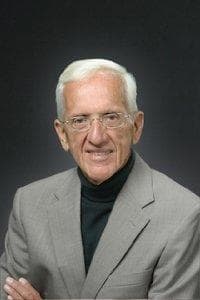Advertisement
Food And Health: A 'Whole' Chat With Author T. Colin Campbell

Most of us know we’re supposed to eat more fruits and vegetables and less processed food, but there’s a growing health movement that goes much farther, arguing that most of our modern diseases – diabetes, heart disease and many cancers – can largely be blamed on the animal fat in our diet. (See this recent story about the link between diabetes and a diet rich in red meat.)
Dr. T. Colin Campbell, an emeritus professor of Nutritional Biochemistry at Cornell University, is a key researcher behind this whole-food, plant-based diet push.
Campbell, firebrand author of The China Study, the well-known tome on nutrition and disease, has just released a new book, Whole, which is already climbing the New York Times bestseller list.

As its name suggests, Campbell advocates eliminating processed foods, oils, and animal protein, including dairy, in favor of plant-based protein. New York Times food columnist Mark Bittman has long championed a modified version of this – a “vegan before 6 p.m.” diet of meat-free breakfasts and lunches – as he promotes in his own new book, VB6.
Campbell, who is highly critical of the mainstream nutrition research establishment, makes the case that eating a whole food, plant-based diet can prevent some diseases and reverse the progression of many others, and he has decades of peer-reviewed articles to support his claims.
The message that there are concrete choices we can make to improve our health is an empowering one, and Campbell’s mission has increasing traction. Yet the whole-food, plant-based diet is still considered more extreme than what most mainstream health experts suggest, and cooking virtually all meals from scratch and eliminating many everyday food staples is not always an easy transition.
In putting so much emphasis on nutrition as the basis for illness, other complexities arise. For instance, does viewing the diet as a panacea for preventing or reversing disease create expectations for some patients that are impossible to meet? Where might this leave the millions of patients with genetic diseases or autoimmune diseases – which aren’t associated with lifestyle and diet in the same way?
Curious about these potential consequences, I asked Dr. Campbell directly. Here is an edited version of our conversation:
Given the cost of many chronic diseases and long-term complications, and compared to other more invasive or expensive interventions, the benefits of switching our diets is good news, even if it might mean a big adjustment. Why do you think there is resistance to an idea that is fundamentally a simple one—change the way you think about nutrition, and you will see the results?
Money is made when fixing sick people, not in maintaining healthy people. Exceptionally well-endowed and powerful industries that survive on our money are not very serious about converting us to non-customers. Yes, the message is remarkably simple, but history shows us that considerable efforts, intentional or unintentional, have been made to ignore it, misunderstand it or make it complicated.
The healthier we eat, the better, no matter what our medical status, but can a plant-based diet of whole foods actually lessen the symptoms or minimize the progression of genetic and/or autoimmune diseases?
Every disease begins with genes but this is not a death sentence. For the most part, genes, good and bad, are controlled by nutrition [i.e., the food we consume]. With the right nutrition resources, our marvelous bodies, while always striving for health, manage which genes to express and which ones to keep quiescent.
There is also considerable evidence that the initiation and expression of many autoimmune diseases may be influenced by nutrition (and therefore would be repressed by eating whole foods), sometimes initiated early in life, from what mothers eat while pregnant and nursing. We need more awareness of this phenomenon, and then we need to do more research on mother-child interactions.
There are those who claim (with fervor) that eating whole, plant-based foods can cure just about every illness. Do you think this places unrealistic expectations on people with genetic disorders—that is, people whose conditions are not associated with lifestyle or behavior?
I also have fervent views not to make claims for this dietary lifestyle that are not supported by reliable evidence. Predicting future events for this practice is not an exact science. Forecasting health and disease outcomes is a matter of odds, not a matter of certainty. We cannot say that all ailments will be controlled in all individuals by this nutritional strategy. But, on the basis of probability, it is abundantly clear that this dietary lifestyle has a breadth of effect that is greater than any combination of drugs and procedures ever used, without the accompanying side effects that are common to virtually all drugs.
Say someone wants to start eating more plant-based protein but isn’t ready to commit fully to the diet. Do incremental changes still yield health benefits?
Although slowly transitioning to [this way of] eating may produce some benefits, they are likely to be small. Who wants to have a small heart attack or just a little diabetes? When we take small incremental steps, we risk returning to our former condition. A transition should be sufficiently complete to overcome our addiction to animal fat and to some extent high sugar and salt. The sooner and more complete is our transition, the more likely that these addictions will be broken. If we choose to take small steps, we should be mindful of what is the ultimate goal: ideal health that can be sustained.
Readers, thoughts on the whole foods, plant-based diet, or on Bittman’s more moderate VB6 approach?
Laurie Edwards teaches writing at Northeastern University and is the author most recently of In the Kingdom of the Sick: A Social History of Chronic Illness in America.
This program aired on June 20, 2013. The audio for this program is not available.